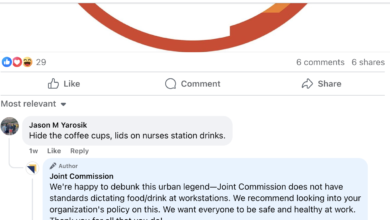Only quarter of nurses would recommend working in NHS

Only one in four nurses would recommend working for the NHS to other people, a new survey has shown.
Just 26% of nurses working across the health service said they would recommend a job in the NHS, citing poor pay and increasing workload as deterrents, according to research by the University of Bath.
“When nurses are the least likely of all NHS staff to recommend a career in the health service, ministers should sit up and listen”
Patricia Marquis
Nurse leaders have warned that the figures are proof of a “burnt out and demoralised” workforce and have called for there to be immediate interventions to support nurse retention.
The University of Bath has today published the latest headline findings from an ongoing survey which has been monitoring NHS staff retention since 2020, following the Covid-19 pandemic.
The update today has compiled the most recent results from the fourth wave of the survey, which has looked at the period between March 2023 and June 2023.
Some 1,500 NHS employees in England, including nurses, were surveyed by YouGov as part of this wave of research.
The survey found that nearly half of frontlines staff (47%) had looked for a job outside the NHS, while 14% reported having applied for one or more non-NHS jobs.
Among the respondents who said they had applied for jobs outside the NHS, almost one in four (23%) said the applications were for supplementary paid work in addition to their NHS job.
“I applied for, and secured, a second job to supplement my income,” said one nursing support worker working in mental health.
Similarly, the survey found that the primary motivation for seeking non-NHS employment was higher pay.
One nurse working in acute services said they had applied to leave for this reason.
“No uplifting despite policy in place stating I should change banding once completing a master’s degree – which I did as of January 2023 – as ‘there is no money’,” they said.
The findings showed that psychological stress, workload, staff shortages and pay were the top four reasons for staff wanting to leave the NHS.
One nursing support worker in mental health said: “Hours are not the issue, it is the other things surrounding the job, such as violence and aggression, poor pay, bureaucracy, understaffing.”
NHS staff reported increasing symptoms of burnout, with one in two feeling very tired or drained most days or every day.
One nurse working in acute services said: “Staff mental health and burnout is not taken seriously enough.
“Staff [are] made to feel like they have to work, some [are] made to feel guilty [for] being off work.”
“I worry about the future of the NHS and of nursing”
Survey respondent
Meanwhile, staff confidence in their working conditions improving and their future in the NHS were both low.
Concerningly, just one in four (26%) NHS nurses said they would recommend working for the NHS to other people.
One hospital nurse said: “I would not recommend working in healthcare to anyone and actively tell my daughter it is the worst career to go into.
“The pay does not reflect the amount of education you undertake and the ever-increasing workload asked of the profession.”
A mental health nurse working in the community said: “The NHS is a really hard place to work, I would not recommend anyone I liked to join it.
“I worry about the future of the NHS and of nursing.”
Staff viewed improvements to their pay, staffing levels and workload as the top priorities for change to increase retention rates.
Meanwhile, greater recognition from the government, improved career progression and more flexible working were also factors they felt were important.
This was echoed by the executive director of the Royal College of Nursing in England, Patricia Marquis, who said the findings of the survey showed an NHS workforce “at the end of its tether”.
She said: “Devastating nursing shortages are leaving staff burnt out and demoralised, unable to provide the level of care they want to.

Patricia Marquis
“When nurses are the least likely of all NHS staff to recommend a career in the health service, ministers should sit up and listen.”
Ms Marquis highlighted how nursing staff wanted to be fairly rewarded for their work but had instead “endured over a decade of real-terms pay cuts”.
“It should be little wonder pay is a primary motivator for those seeking work outside of the NHS,” she said.
“Nursing is an incredible career but more must be done to attract people into the profession and keep those already in it.
“Nothing less than a significant above-inflation pay award will help deliver pay justice for nursing staff, stabilise the workforce and safeguard patient care.”
Meanwhile, the chief executive of NHS Employers, Danny Mortimer, said the latest research echoed previous findings of the severe level of stress and burnout faced by staff who worked through the pandemic.
However, he noted that the most recent NHS Staff Survey had shown overall improvements in staff experience and that the NHS had seen improvements in the level of retention across its services.
Mr Mortimer added: “Every staff member retained helps achieve the vision of delivering well-staffed, high-quality services.
“Organisational and team culture, health and wellbeing, staff engagement and flexible working all have a direct impact.”







